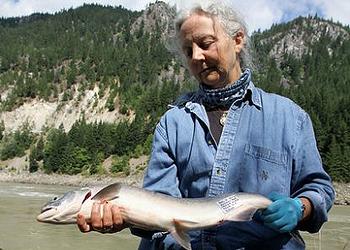
VANCOUVER, British Columbia, Canada, October 16, 2016 (ENS) – Independent biologist Alexandra Morton has filed a lawsuit against Canada’s Minister of Fisheries and Oceans for putting wild salmon at risk by failing to test farmed salmon for a viral disease.
The lawsuit alleges that Minister of Fisheries and Oceans Dominic LeBlanc is breaking the law by not testing British Columbia farmed salmon for the Piscine reovirus before allowing them to be transferred into ocean pens next to wild fish.
The virus has spread like wildfire in Norway and Chile and also is present in the United Kingdom, Ireland, the United States and Canada.

Ecojustice lawyers, on behalf of independent biologist Alexandra Morton, filed a lawsuit October 12 seeking a court order to force the Minister of Fisheries and Oceans to comply with the Fishery (General) Regulations and apply the precautionary principle when approving fish transfer licences.
The regulations require the minister to ensure that farmed fish do not pose a threat to the protection and conservation of wild fish before allowing farmed fish to be transferred into the ocean.
“According to federal fisheries laws, the Minister of Fisheries and Oceans is required to ensure that farmed fish are not carrying any harmful diseases or disease agents before he can license their transfer into the ocean,” said Morgan Blakley, of Ecojustice, Canada’s only national environmental law charity.
“The Minister, however, refuses to test farmed salmon for Piscine reovirus. In my opinion, this course of action is illegal and could lead to irreparable damage to British Columbia’s wild salmon stocks,” said Blakley.
Piscine Reo-virus, PRV, is highly contagious and likely causes a disease called heart and skeletal muscle inflammation, HSMI.
This disease causes heart damage to salmon that makes it extremely difficult for them to capture prey, swim upstream and spawn or escape predators.
By 2015, salmon species affected included: Chinook Salmon, Oncorhynchus tshawytscha, collected in British Columbia; wild Cutthroat Trout, Oncorhynchus clarkii, wild Chinook Salmon, wild Sockeye Salmon, O. nerka, wild Steelhead Trout, Oncorhynchus mykiss, wild Coho Salmon, Oncorhynchus kisutch, wild Chum Salmon, Oncorhynchus keta, and farmed Atlantic Salmon, according to the Department of Fisheries and Oceans. These species all tested positive for PRV through molecular testing.
In May 2016, the Canadian government revealed that HSMI had been found on British Columbia salmon farms.
“This fall, with the Fraser sockeye salmon run size at the lowest ever recorded since 1893, the minister must do all he can to protect wild salmon,” urged Morton.
“Instead the minister has chosen to turn a blind eye to his responsibilities, as laid out in the law. We’re here to help him make a better decision,” she said.
“There is no reasonable excuse not to test farmed salmon for Piscine reovirus before they are transferred into pens along Canada’s highly vulnerable wild salmon migration routes,” said Morton.
Fisheries and Oceans Canada says on its website that testing is not that straightforward. Because “PRV has not yet been successfully cultured, a cause and effect relationship between PRV and HSMI in Atlantic Salmon farmed in Norway cannot be definitively established, but is still under investigation.”
“Moreover, the fact that clinically healthy wild and farmed Atlantic Salmon collected from fresh and saltwater in Norway can also contain PRV, some with high loads, has led some researchers to question the role of PRV in the development of HSMI,” the agency explains.
Last year, Ecojustice lawyers, working on Morton’s behalf, successfully took the Minister of Fisheries and Oceans to court for unlawfully delegating his regulatory responsibilities to fish farm companies.
Copyright Environment News Service (ENS) 2016. All rights reserved.
